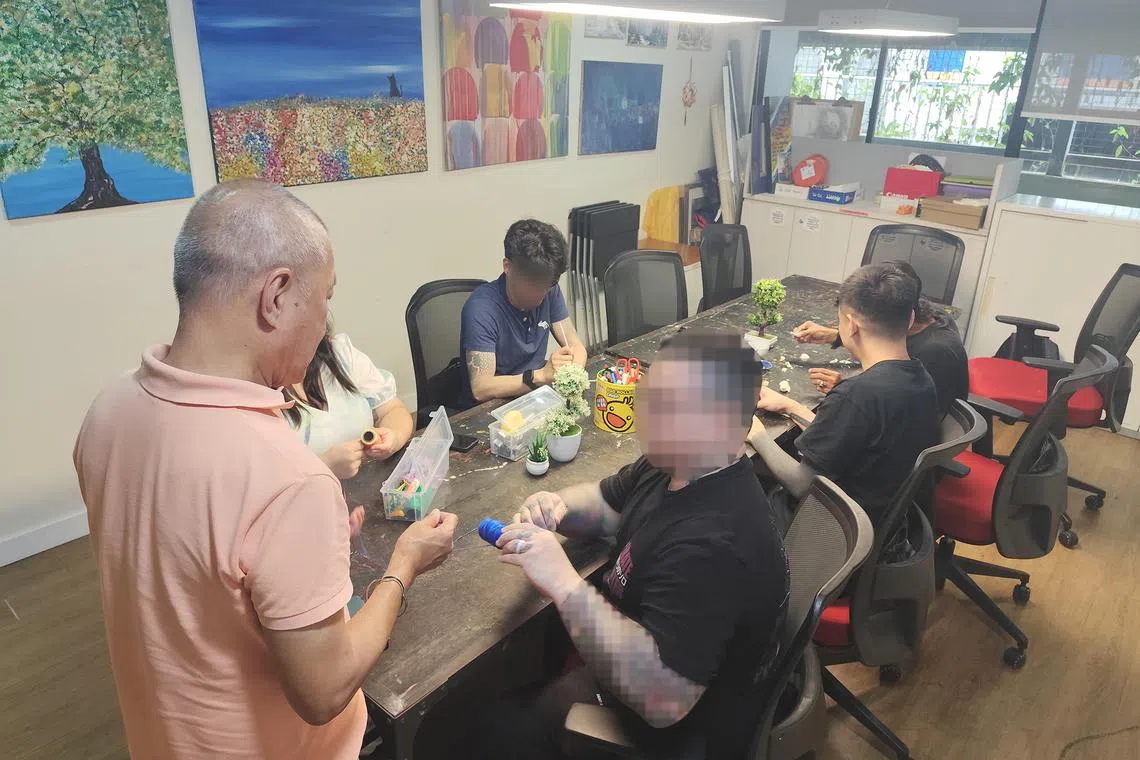‘We don’t want youth to enter darker places’: Counsellors say support key to kicking vaping habit
Sign up now: Get ST's newsletters delivered to your inbox

A professional artist conducts weekly art classes at We Care's drop-in centre as part of the support given for people trying to overcome addiction.
PHOTO: WE CARE COMMUNITY SERVICES
Follow topic:
- Social workers urge compassion for youth vapers, highlighting that punishment may deter them from seeking help due to shame and fear of legal repercussions.
- Vaping stems from issues like unstable families, peer pressure, academic stress, or a lack of guidance, often used as a coping mechanism or to feel a sense of belonging.
- Support and understanding are crucial; authorities won't punish those seeking help to quit, and social support, like Care Corner's success with a trio of youths, encourages change.
AI generated
SINGAPORE - Amid a wave of tougher enforcement action and public criticism of young vapers, some social workers are calling for more compassion for these addicts.
Instead of shaming or condemning them, these social workers believe parents and teachers can support them in their recovery.
Recent reports of young people vaping
With vaping illegal here, others called for enhanced enforcement efforts, and laud the impending move to label etomidate
Ms Flora Tan, senior social worker at Care Corner Youth Services, said its team is grateful for the legal update as it enables them to act more decisively regarding vaping.
But she is worried public discourse centred on shame and punishment might deter youth from seeking help.
Ms Tan said: “Addiction is already something that is done in the dark. We don’t want our youth to go into even darker places.”
She added that some assume these young people are deliberately choosing to indulge in vaping or cause trouble in public.
She said some young people start vaping with their peers, when they do not have a sense of security at home or at school.
“Often, it is a way to feel they belong with these friends when they don’t find it anywhere else.”
Ms Audrie Siew, executive director of the children and youth group at The Salvation Army, said young vapers share common factors such as unstable families, exposure to peer pressure, academic stress or lack of structured supervision.
Ms Siew said: “For some, vaping is an attempt to cope with anxiety and stress. For others, it is a misguided pursuit of trendiness.”
She added that research shows those with adverse childhood experiences have a higher risk of addiction and risky behaviours.
The Salvation Army team addresses deeper issues such as trauma, lack of supervision or strained familial relationships.
Mr Alvin Seng, a counsellor at We Care Community Services, which runs an addiction recovery centre, said it is important to not antagonise or escalate tensions with the youth, as doing so would likely push them towards more vape or Kpod use.
He recommended approaching young people when they are in a better state, and not when they are intoxicated or distressed.
Mr Seng added that a recovery plan may involve group counselling and support groups.
Youth Guidance Outreach Services executive director Wilson Tan said its smoking and vaping cessation programme focuses on intervention and rehabilitation, rather than punitive measures.
The programme provides one-to-one counselling for young people.
It includes hearing the testimony of a former addict, keeping a journal of their smoking cravings and teaching them how to cope with withdrawal symptoms.

Those who need help to quit vaping can join the Health Promotion Board’s I Quit programme by calling the QuitLine on 1800-438-2000 without fear of prosecution.
Possessing, using or buying vapes carries a maximum fine of $2,000, but the authorities said no action will be taken against those who voluntarily dispose of their vapes, and their identities will not be traced
Ultimately, Ms Tan said the most important factor that encourages young vapers to change is social support.
So far, her team has found some success with three young vapers between 16 and 17 years old.
One of them wanted to quit, and encouraged two friends to do the same. The trio now meet Care Corner’s social workers weekly to track their progress.
Ms Tan encouraged parents and teachers not to give up on journeying with these young people.
She said: “Quitting is not just about going through four or five sessions of counselling, but the kinds of relationships they have in their lives that can keep them accountable.”
Helplines
Mental well-being
National helpline: 1771 (24 hours) / 6669-1771 (via WhatsApp)
Samaritans of Singapore: 1-767 (24 hours) / 9151-1767 (24 hours CareText via WhatsApp)
Singapore Association for Mental Health: 1800-283-7019
Silver Ribbon Singapore: 6386-1928
Chat, Centre of Excellence for Youth Mental Health: 6493-6500/1
Women’s Helpline (Aware): 1800-777-5555 (weekdays, 10am to 6pm)
The Seniors Helpline: 1800-555-5555 (weekdays, 9am to 5pm)
Counselling
Touchline (Counselling): 1800-377-2252
Touch Care Line (for caregivers): 6804-6555
Counselling and Care Centre: 6536-6366
We Care Community Services: 3165-8017
Shan You Counselling Centre: 6741-9293
Clarity Singapore: 6757-7990
Online resources
carey.carecorner.org.sg
(for those aged 13 to 25)limitless.sg/talk
(for those aged 12 to 25)


